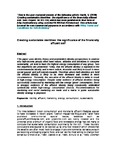Creating sustainable identities: the significance of the financially affluent self
| dc.contributor.author | Hurth, V | |
| dc.date.accessioned | 2016-02-11T10:42:32Z | |
| dc.date.available | 2016-02-11T10:42:32Z | |
| dc.date.issued | 2010-05 | |
| dc.identifier.issn | 0968-0802 | |
| dc.identifier.issn | 1099-1719 | |
| dc.identifier.uri | http://hdl.handle.net/10026.1/4312 | |
| dc.description.abstract |
<jats:title>Abstract</jats:title><jats:p>This paper uses identity theory and postmodern identity perspectives to analyse why high‐income groups often have values, attitudes and intentions to consume sustainably, yet tend to have the highest energy consumption of any group. Two key arguments are presented. The first is that the affluent identity is opposed to the environmentalist identity and is more salient, desirable and likely to result in more social support and self‐esteem rewards. Therefore, where both identities are held the affluent identity is likely to be more dominant and invoked in more circumstances. Second, the invocation of the affluent identity is liable to result in high‐energy consumption. Despite some evidence of affluent identities being successfully connected by marketing with low‐energy ‘green’ consumption, there is stronger evidence of the affluent identity being consistently embedded symbolically within high‐energy consumption choices. Recommendations for marketing and social marketing are made and a matrix to guide sustainable identity strategies is proposed. Copyright © 2010 John Wiley & Sons, Ltd and ERP Environment.</jats:p> | |
| dc.format.extent | 123-134 | |
| dc.language | en | |
| dc.language.iso | en | |
| dc.publisher | Wiley | |
| dc.subject | identity | |
| dc.subject | affluent | |
| dc.subject | marketing | |
| dc.subject | energy | |
| dc.subject | consumption | |
| dc.subject | sustainability | |
| dc.title | Creating sustainable identities: the significance of the financially affluent self | |
| dc.type | journal-article | |
| dc.type | Article | |
| plymouth.author-url | https://www.webofscience.com/api/gateway?GWVersion=2&SrcApp=PARTNER_APP&SrcAuth=LinksAMR&KeyUT=WOS:000279326000002&DestLinkType=FullRecord&DestApp=ALL_WOS&UsrCustomerID=11bb513d99f797142bcfeffcc58ea008 | |
| plymouth.issue | 3 | |
| plymouth.volume | 18 | |
| plymouth.publication-status | Published | |
| plymouth.journal | Sustainable Development | |
| dc.identifier.doi | 10.1002/sd.453 | |
| plymouth.organisational-group | /Plymouth | |
| plymouth.organisational-group | /Plymouth/REF 2021 Researchers by UoA | |
| plymouth.organisational-group | /Plymouth/REF 2021 Researchers by UoA/UoA17 Business and Management Studies | |
| dc.identifier.eissn | 1099-1719 | |
| dc.rights.embargoperiod | Not known | |
| rioxxterms.versionofrecord | 10.1002/sd.453 | |
| rioxxterms.licenseref.uri | http://www.rioxx.net/licenses/all-rights-reserved | |
| rioxxterms.type | Journal Article/Review |


